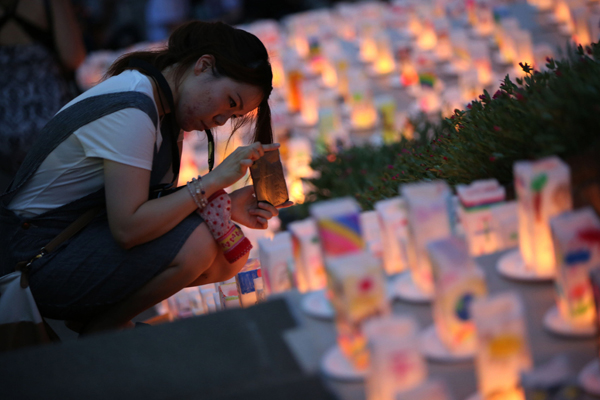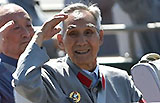Hiroshima, Nagasaki a pricy lesson for militarism
(Xinhua) Updated: 2015-08-09 17:17
 |
|
Paper lanterns are placed for the victims of the atomic bombing on Nagasaki on the eve the 70th anniversary of the Nagasaki Atomic Bombing at the Peace Park in Nagasaki, southern Japan Saturday, August 8, 2015. [Photo/IC] |
BEIJING - The memorial services in Hiroshima and Nagasaki should serve as an opportunity for Japan not only to commemorate the victims of atomic bombs but also to have a thorough reflection upon its history of militarism.
Starting Thursday, Japan has held several high-profile events to mark the 70th anniversary of the bombings of Hiroshima and Nagasaki, the only two nuclear attacks in human history.
Hiroshima's memorial services on Thursday were attended by the city's mayor and Prime Minister Shinzo Abe, both of whom had addressed a crowd of about 55,000 people, including survivors of the attack, their descendants, peace activists and representatives from about 100 countries and regions.
Abe also attended, accompanied by US ambassador Caroline Kennedy, the memorial services in Nagasaki Sunday.
It is undeniable that the nuclear bombings of Hiroshima and Nagasaki 70 years ago are real tragedies for the whole mankind. It is worth sympathizing as hundreds of thousands of innocent civilians died in the blasts of the atomic bombs, or from after-effects in the months and years to follow.
However, considering what has been said and done by the incumbent prime minister since he took office, a hidden context behind those commemorating events needs particular attention.
While keeping evading from Japan's responsibilities in its war past, Abe and his cabinet have been attempting to re-brand their country as a victim of World War II and glorify its war criminals, who are revered in the notorious Yasukuni Shrine.
As full sympathy should be given to the innocent lives perished in Hiroshima and Nagasaki in 1945, it should also be kept in mind that those lives were, by no means, the only victims of the war Japan had initiated.
Millions of innocent people were mercilessly massacred, cities and villages pillaged, as Japanese army evaded China and other Asian countries only to satisfy its militarism ambitions.
Aside from paying respect to the Japanese victims of the atomic bombs during the memorial services, the Japanese authorities and people should also condemn the perpetrators of the war crimes and reflecting upon the frenzied ideologies that resulted in all the tragedies.
- Japan to suspend Okinawa US base relocation work
- Japan demands explanation over alleged US spying
- US surveillance of Japan blow to Abe government
- Right-wingers use pretenses to remilitarize Japan
- Japan, South Korea new destinations for Chinese property investors
- Japan approves increase in Fukushima compensation to $57 bln
- Japan's defense policy overturn 'brings Asia closer to war': expert






